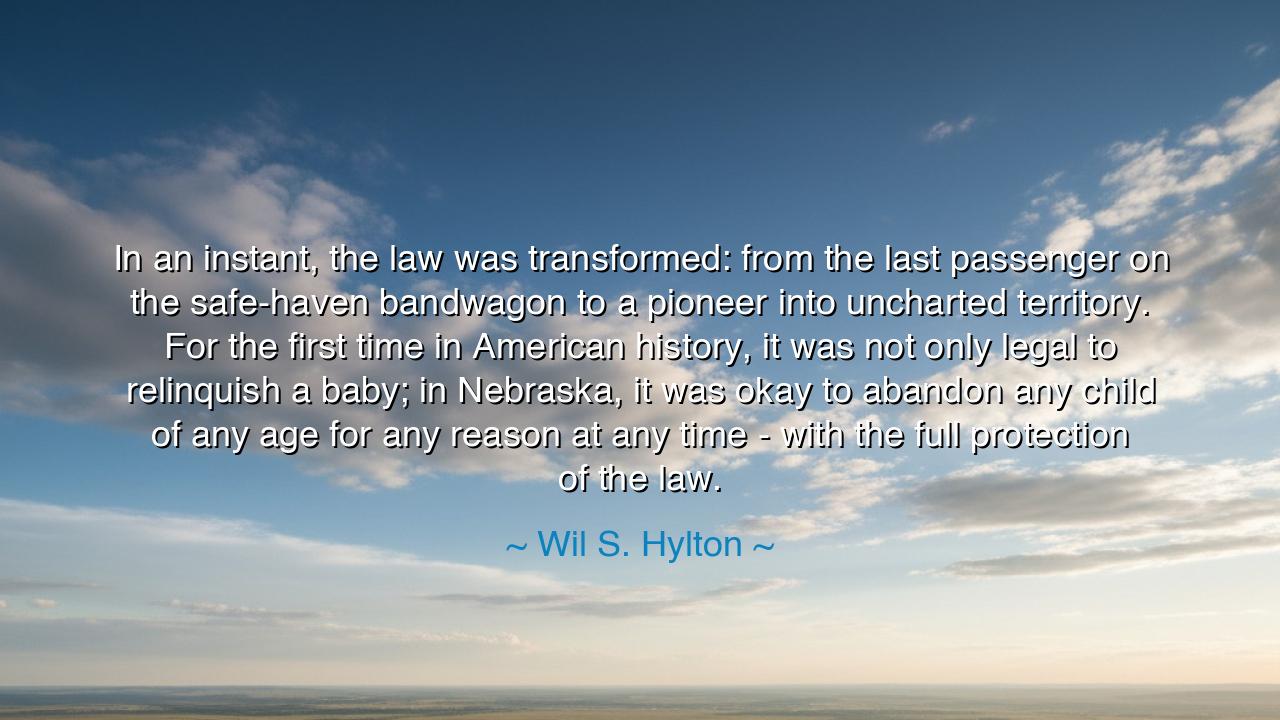
In an instant, the law was transformed: from the last passenger
In an instant, the law was transformed: from the last passenger on the safe-haven bandwagon to a pioneer into uncharted territory. For the first time in American history, it was not only legal to relinquish a baby; in Nebraska, it was okay to abandon any child of any age for any reason at any time - with the full protection of the law.






Hearken, O seekers of wisdom, to the words of Wil S. Hylton, who cast a vigilant eye upon the transformations of law and society: "In an instant, the law was transformed: from the last passenger on the safe-haven bandwagon to a pioneer into uncharted territory. For the first time in American history, it was not only legal to relinquish a baby; in Nebraska, it was okay to abandon any child of any age for any reason at any time—with the full protection of the law." In these words lies a meditation on the weight of law, the peril of unexamined statutes, and the consequences of granting unchecked freedom under the guise of legality.
Since the dawn of civilization, societies have wrestled with the protection of their young. In ancient Athens, the law forbade the abandonment of infants except under dire circumstances, while in Rome, exposure of a child was permitted under certain customs but constrained by societal expectation. Hylton’s reflection demonstrates that law is not static; it evolves, sometimes with clarity, sometimes with peril. The transformation he observes in Nebraska marks a moment when legal protection and social responsibility diverged, leaving the vulnerable exposed to the abstract authority of statute rather than the tangible care of community.
The essence of the safe-haven laws was to provide a secure, legal means for parents in desperate circumstances to relinquish infants without fear of prosecution, ensuring their safety and survival. Yet Hylton emphasizes the radical expansion: in Nebraska, the law extended protection not just for babies, but for children of any age, permitting abandonment "for any reason at any time." This shift illuminates the tension between compassion codified and boundaries neglected—a cautionary tale of how the reach of legal authority can outpace moral and societal judgment.
Consider the story of a parent in ancient Rome, who, constrained by poverty or political turmoil, faced a grave choice regarding a child. The law allowed exposure, yet custom and conscience guided action. Society imposed informal limits to safeguard life. Nebraska’s law, as Hylton observes, removes such checks: legality alone governs action, and the protections of the law may enable what the collective moral sense of the people might never sanction. Here is a reminder that legality and morality, while intertwined, are not identical; one may shield acts that the heart and conscience would condemn.
This moment is both illuminating and unsettling. Law is a shield and a guide, yet without discernment, it may sanction behaviors that threaten the very fabric it is meant to uphold. Hylton’s words evoke the danger of granting blanket legal protection without consideration of social, ethical, and developmental consequences. The child, historically the most vulnerable, becomes subject not to the care of the community but to the abstract authority of statute—a cautionary tale echoing the ancients’ insistence that law must be tempered by wisdom and foresight.
From this reflection emerges a timeless lesson: the reach of law must be measured, deliberate, and tempered by ethical judgment. Just as the sages of old warned that statutes without virtue become instruments of harm, modern lawmakers must balance legality with humanity. Hylton’s account of Nebraska reminds us that the protection of the vulnerable is the highest purpose of law; when legal authority diverges from moral stewardship, society risks permitting acts that erode the bonds of community and the sanctity of life.
O seekers of wisdom, let this teaching guide your thoughts and actions. Recognize that legal authority is a tool, not an arbiter of morality; that statutes must be scrutinized not only for compliance but for their impact on the most defenseless among us. Advocate for laws that protect life, nurture responsibility, and preserve societal trust, while remaining vigilant against expansions of legality that may sanction harm under the shield of law.
Take this teaching into daily life: honor the vulnerable, weigh legality against conscience, and engage in public discourse to ensure that statutes serve humanity rather than abstract authority alone. Hylton’s reflection is a clarion call: laws must guide, protect, and illuminate justice, not merely sanction acts without accountability. In doing so, we uphold the ancient truth that the welfare of the weak is the truest measure of a society’s wisdom, compassion, and moral courage.






AAdministratorAdministrator
Welcome, honored guests. Please leave a comment, we will respond soon